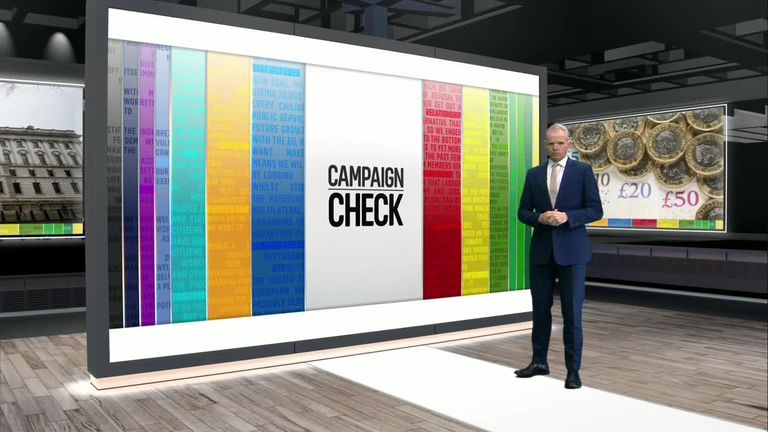Why the IFS thinks parties are being less than honest with voters
Their manifestos are starkly different, but Labour and the Tories have each drawn fire from the respected economic think-tank.
Thursday 28 November 2019 18:04, UK
"All politicians are liars" is a common refrain from voters, particularly during an election.
It's more unusual to hear accusations of dishonesty from established think-tanks, but that is just what the Institute for Fiscal Studies (IFS) has said of Labour and the Conservatives in its assessment of their manifestos.
Its blunt summary of tax and spending plans claims that neither main party "is being honest with the electorate".
The scorn is equally distributed, but the reasons are party-specific.
The Conservatives are criticised for being unrealistic about future tax-raising requirements, even in a manifesto so thin on big ideas IFS director Paul Johnson said it had "nothing in it".
The most radical measure is effectively "to do nothing" by promising income tax, national insurance and VAT will not rise.
It may be "immensely modest" but the IFS regards the Conservative's chances of sticking to it as "remote".
The think-tank says the lesson of the last government was that the Conservatives failed to stick to plans to cut public spending, and this time their spending is likely to increase over the course of a parliament.
In evidence it cites uncosted measures such as social care, and capital projects including Northern Powerhouse Rail.
As a result it says the Conservatives will either have to raise some taxes or break the promise to balance the budget, a choice that is not being made clear.
Labour's problem is at the other end of the scale.
Jeremy Corbyn has promised £73bn of new spending, taking tax and spending to peacetime highs, as well as £55bn a year in investment.
Mr Johnson says Labour's expansion is unrealistic, both in the raising and the spending of money.
To take the second first, the IFS say the public sector will simply not be able to "ramp up" to deliver the level of investment spending quickly enough.
On tax raising, Labour has claimed only the highest-earning 5%, paid more than £80,000-a-year, will contribute more, with the balance coming from increases in corporation and capital gains tax.
The IFS say this is untrue as the abolition of some tax relief, including the marriage allowance, will affect many taxpayers who earn less than £80,000.
It also says Labour's plan is unrealistic, and relies on too narrow a slice of contributors.
As a share of GDP Labour's spending plans are not dissimilar to levels in France and Germany, but both those countries have a far broader tax base; more people at more income levels paying more tax.
It is possible to argue that a more even spread of contribution if is inherently fairer but it is a very different argument to the one Labour are making to the electorate, which rests on drawing a clear line between the wealthiest and the rest.
The IFS has also examined the impact of spending plans on national debt, concluding Labour's would increase it to around 75% of GDP, while under the Conservatives it would be stable.
Should the Conservatives win but trade talks with the EU end in a no-deal Brexit at the end of next year however it would rise to more than 80%, the largest impact of all.
Only the Liberal Democrats, judged the most fiscally responsible, would see debt fall as a share of national income.
The IFS concludes: "While the Conservatives continue to pretend that tax rises will never be needed to secure decent public services, Labour pretends that huge increases in spending can be financed by just big companies and the rich.
"In this respect neither Labour nor the Conservatives is being honest with the electorate."
It is a message with which ordinary voters may sympathise.








